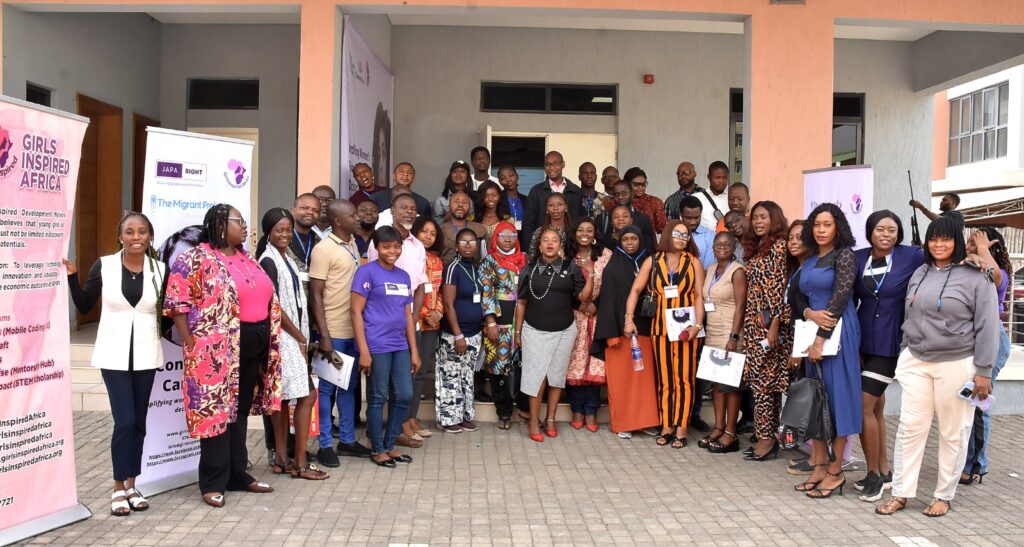The International Organisation for Migration (IOM), in collaboration with the Federal Government of Nigeria, has assisted no fewer than 34,694 stranded Nigerians migrants to return home, mostly from Libya, Lebanon, Mali and Europe among others.
This was made known by the IOM’s Awareness Raising Programme Officer for Nigeria, Cyprine Cheptepkeny, at a training workshop organised by a nongovernmental organisation, Girls Inspired Development Network (GIDN), for journalists in Lagos.
Themed: “Amplifying Women’s Voices in Migration Decision Making,” the workshop saw over 30 journalists from print, broadcast and online media gather in Lagos, to receive lessons on the rudiments of migration reporting.
Speaking on the topic, “The role of the media in amplifying women’s migration decision making: A panacea to strengthening women’s agency,” Cheptepkeny also revealed that there is marked shift in migration trend as women are becoming more daring, and competing favourably with men across the globe as far as migration is concerned.
She noted that out of the 34,694 returned migrants from April 2017 till date, 19,579 were males while 15,115 were females.
She also said Edo State used to record more irregular migrants than other states in Nigeria but revealed that the narrative has changed as northern states of Kano and Katsina seem to be taking over from Edo State.
According to her, 28, 204 survivors were reintegrated, among which 16, 264 were male, and 11,940 were female. She also noted that all the returned migrants have not been reintegrated because some of them had medical conditions when they came back, meaning that they needed to get medical attention first before they could be reintegrated.
Cheptepkeny described the reintegration programme as a core activity of IOM Nigeria, which assists migrants that are willing to return home and supports their reintegration.
She said the reintegration assistance comes in the form of vocational education and training to help them start an income-generating activity of their choice.
She also described the media as critical in framing migration narrative, even as she advised media practitioners to ensure stigma-free language, and promotion of balanced, inclusive news coverage, as well as strict adherence to media standards and ethics.

Also, speaking on the topic, “Empowering women: Catalysts for inclusive migration policies,” the Head of the Migrant Resource Centre, Lagos, Mrs Maureen Ovie, said available data showed that 45 percent of women travel independently, noting the present trend is an indication that the statistics would increase.
She noted that many women have unrealistic expectations, because they lack proper information on the migration process and procedures, and as a result they expose themselves to exploitation.
She is of the view that the government has a critical role to play in increasing awareness on regular migration, counseling, and training to boost employability and gender-responsive environment.
According to her, the government would ensure fair recruitment practices and monitoring of private recruitment agencies, adding that recent findings showed that quacks hide under recruitment agencies to traffic persons.
Similarly, the Head of Migration (South West), National Commission for Refugees, Migrants and Internally Displaced Persons (NCFRMI), Ijeoma Ifeobu, said the Federal Government was working assiduously to ensure that the right messages are promoted to reduce irregular migration.
In her comment, Ms Enitan Ibironke, a lawyer and migration counsellor, said many people risk their lives attempting to cross over Europe through irregular migration.
Ibironke advised the media to focus on developing additional tools, resources and digital content on various platforms to assist women make informed decisions on migration matters.
She equally advised media practitioners not to think that they are helping migrants by reporting their predicaments in negative ways, but should always balance their reportage with the positive side of the story. “When you report negative things about migrants, it dehumanises the survivors. You need to know that you are subjecting him or her to more mental torture. Try to know the psychology of the person, especially our women. Try to know why the person migrated. Some of them were deceived that they would get good jobs abroad, but they ended up facing some challenges. We should change the narrative that women migrate for prostitution. That is not true, some of them travel with good intention of assisting their families,” she stated.
She, however, advised people who intend to travel to seek counsel from professionals who would offer them good advice. “That is why parents should not easily handover their children to anyone who promises to give them, particularly the girl child, a job abroad. The girl child may end up being abused sexually,” she cautioned.
However, Executive Director, GIDN, Mrs Rita Folawewo, in her remarks said the training sought to enhance the capabilities of journalists in Lagos in amplifying women’s voices in migration decision-making processes.
Folawewo said that the training would address challenges faced by the media in strengthening the discourse; highlighting the resources, tools, and opportunities for the media and improving documentation of women’s stories for justice and human rights.
The training organised by the GIDN under its ‘Connect HER Project’ and ‘Japa Right Media Campaign,’ was supported by The Migrant Project.



